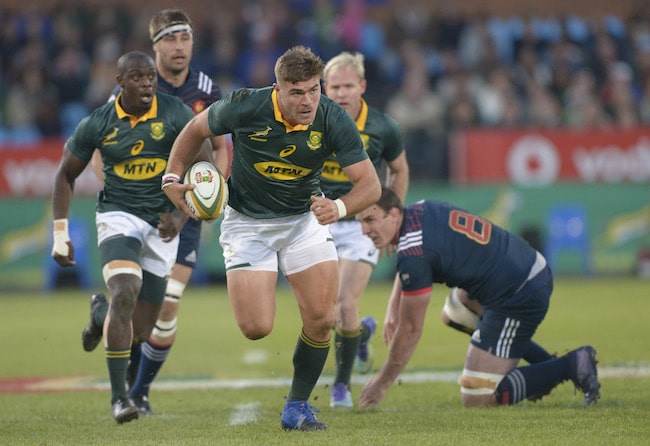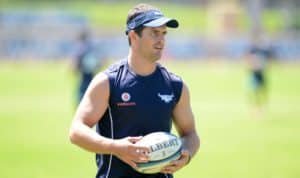These are heady times for Springbok rugby, writes CLINTON VAN DER BERG for SportsClub magazine.
A corner appears to have been turned, a masterplan is in place and a raft of exciting new players has begun to emerge.
At the front of the queue is a 23-year-old hooker. He goes by the name of Malcolm Marx and is the archetype of the modern player: fast, physical, multi-skilled and explosive.
Hooker isn’t a position for the faint-of-heart, requiring tenacity, a thick skin and a relish for combat. Marx has all of this, with the attitude to match.
The Lions player was thrust into the Springbok mix at the worst possible time. The Springboks were getting pumped in Christchurch last September. The game was as good as lost. Marx got the call off the bench. His heart rate surged and he threw himself in. His lineout throwing was all over the place and the Boks sunk without trace.
Yet here he is, both chastened and emboldened by the experience. He took his shots and came out the other side a better player for having banked the experience and worked on his throw-ins. We saw this in the recent series against France, where he was deadly accurate and rampaged like a mad bull, just how he took those lessons to heart.
Marx is so talented you sense he would have emerged as an elite player no matter where he put his roots. But it is at the Lions where his talents flourished. As with Springboks James Dalton and Uli Schmidt before him at Ellis Park, he’s been allowed to mix his game up, free to play as a tight forward and as a fourth, roving loose forward. He cleans rucks with a surgeon’s precision, takes the ball up and rips opposition ball away at the breakdown with the power and instinct of a competition wrestler.
Comparisons with Bismarck du Plessis, another powerhouse South African hooker, are inevitable. Unsurprisingly, after transferring to hooker at high school, Marx’s heroes shifted from Richie McCaw and Schalk Burger to Du Plessis and Keven Mealamu, a pair of vibrant hookers who often flirted with being the world’s best.
Although Marx’s change from flank to hooker has been well documented, less well known is that it came on the recommendation of former Springbok coach Heyneke Meyer. Watching Marx in an U16 game, he remarked with uncanny foresight that ‘he’ll be Bok hooker in five years if he moves to the front row’. As indeed he was.
‘Malcolm had a helluva physical presence from early on,’ says Carl Spilhaus, the former King Edward VII schoolboy coach who knows a good thing when he sees it. ‘The significant thing about his game was that, despite his size, he didn’t try to run over you. He was happy to offload. He loved his rugby, but the other massive influence in his life was water polo. That sport makes chaps tough; Malcolm thrived.’
Spilhaus says Marx benefited from playing in a succession of good age-group rugby sides that would win more than lose. Marx worked hard, doubling up his efforts in the gym to ensure he had the strength to match his ambition. He also embraced the radical positional switch, knowing that if a rugby brain like Meyer believed he could make it as a front rower, he very well could.
Spilhaus, now the rugby master at Jeppe Boys, always believed Marx would eventually play for South Africa. Many other boys trained hard, but Marx also became technically excellent and had the bearing of a ‘meneer’. He made it his mission to master the art of hooking, even though he only made the switch midway through high school.
Rugby was a central part of Marx’s life as a schoolboy. He was a hostel laaitie, the drive from Northcliff a little too demanding for his working mum. The winter afternoons allowed him to practice and focus on his favourite sport with abandon. He dabbled a little in shotput, but rugby was his thing. He loved it. SA Schools colours duly came in 2012.
Marx thrived in that environment and it’s little surprise that his best mates remain those he spent time with at boarding school.
A beefy 117kg, he’s ready-made for front-row play. Despite the extreme physical demands of being almost constantly locked into the heart of the scrum, he sees the pressure as being little different to other positions. ‘They each have their demands,’ he says, giving no hint of the physical stress he must endure.
Being the vital man in the lineouts also brings its unique pressure. He used to happily be one of the bunch lining up to contest possession. Now he’s the critical starting point, the man responsible for the ball’s trajectory. Fortunately, his nerves have settled and he’s the man in possession of the Bok jersey.
It helped, too, that he made his Super Rugby debut in 2014 against the Hurricanes, who happened to have the world’s best No 2, Dane Coles, in their ranks. Marx gave as good as he got.
Despite the Springboks dropping to seventh in the world and enduring the worst year in their history in 2016, he somehow stayed immune to the negativity that swamped them. He didn’t play much, but revelled in spending time in the Bok environment.
He characterises the 2017 squad as one that is willing to work hard, all too aware of the need to atone for the horrors of last season. The rest of us might obsess about it, but for the players themselves, that’s been packed away, consigned to history. All they want to do is set it right.
They’re now banging on the door for a place in the world top three, a realistic target if they have an improved Rugby Championship campaign against New Zealand, Australia and Argentina. The All Blacks remain the standard-bearers, fiendishly difficult to beat, but the other two have vulnerabilities that a ruthless, rejuvenated team like the Springboks ought to be able to exploit.

Unsurprisingly, Marx is having the adventure of his life. He hasn’t been at the top table long enough to allow cynicism to crowd his mind. There’s a pleasant enthusiasm in his demeanour and he remains unfailingly grounded. Old schoolmasters are greeted as ‘sir’ and there’s a warm, firm handshake for new acquaintances.
The only thing extreme about him is how he plays. He’s largely a home boy who spends his downtime with his girlfriend or with mates. Occasionally they’ll escape to the Vaal for a day out, while that perpetual rugby sideline, golf, has also started cropping up. ‘I’m not the best, but I try,’ he quips.
His ambitions are admirable. ‘I want to play better rugby,’ he says. ‘There’s always room for improvement. I want to be better than last week and better than the week before that.’
Marx, you suspect, is in it for the long haul. He’s tasted success with the Boks, and he likes it. Anyone looking to knock him off his perch ought to be bigger, stronger and more ambitious.
There can’t be many.
– This article first appeared in issue 110 of SportsClub magazine





